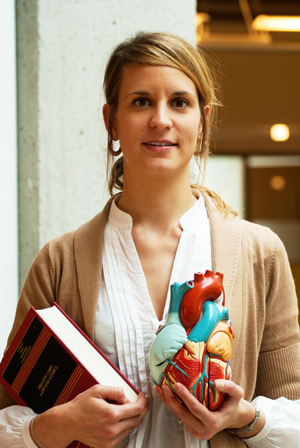McGill Research Group on Health and Law member Mélanie Mader wants to have a frank discussion about organ donation and she has an unusual suggestion for how to go about doing so.

By Victoria Leenders-Cheng
Enough with the ubiquitous purple and pink hearts of Valentine’s Day.
Mélanie Mader wants to talk about the real thing, that four-chambered circulatory organ the size of a fist, composed of striated muscle tissue and responsible for pumping blood through our vessels and veins.
Mader, the newest addition to the Faculty of Law’s Research Group on Health and Law, recently completed her PhD at the University of Neuchâtel in Switzerland with a dissertation focusing on the complex problem of organ shortages and organ donation.*
“The most common organs that are transplanted today are the kidney, heart, and liver,” Mader said, adding that the organ shortage is an urgent issue that she considers a public health problem. “We have an aging society with lots of problems like obesity and diabetes that contribute to the increasing demand for organs but the number of donors is staying the same.”
Mader’s thesis suggests what she calls a “new and promising approach” to increase organ donation rates: financial and non-financial incentives offered by the state. These include tax breaks for willing donors, priority status on the waiting list should a registered donor him or herself ever need an organ transplant, discounts on health insurance premiums and a rebate on a donor’s funeral costs.
The topic of organ donation is sensitive one, easily subject to skewed media portrayals, but Mader says she was pleasantly surprised when she presented her thesis in Switzerland last year. “Very often, if you associate money with organs, people get scared and there’s a lot of criticism about the organ trade and transplant tourism,” she said, “but it was very well received.”
This may be in part because the subject is a timely one: in 2007, Switzerland passed a new organ transplantation law that still failed to raise donation rates. Mader, softspoken but impassioned, is hoping that her thesis will contribute to renewed discussion about the subject and lead to changes in the transplantation law in Switzerland in the next two to three years.
A Swiss citizen who speaks German, French, English and some Italian, Mader is already well-versed in matters of public policy. She was elected to the municipal legislative body as the youngest member of communal parliament in 2001 and completed an LLM specializing in comparative public law at the University of Cambridge. She moved to Montreal in 2009 to complete her PhD thesis by comparing the Canadian context of organ donation with that of her native country.
“It’s very interesting to compare the numbers between Switzerland and Quebec because the number of people on the waiting lists and the number of available donors is very comparable,” she noted.
There are multiple reasons for the current organ shortage. Socially, the subject is a difficult one to breach because it prompts often uncomfortable conversations about death. Biologically, only one in every 100 deaths occurs in circumstances that allow for organ retrieval in the first place. And while various European countries operate on a model of presumed consent in which everyone is considered a potential donor unless the individual specifies otherwise, Mader notes that this idea has been around for a long time and has not been proven to actually raise donation rates.
In Spain, for example, Mader argues that the high donation rate can be attributed to the efficiency of the transplant system. “It’s more a question of organization within the hospitals,” she said, citing incentives within the medical profession to detect organ donors and incentives for doctors to talk to the families about organ donation as reasons for the higher donation rate.
Since arriving in Montreal two years ago, Mader has also been a participant of the Quebec-Transplant ethics committee meetings and has witnessed many discussions about transplantation, from organ allocation to criteria for such allocation as well as the issue of whether or not donors and recipients should remain anonymous.
“In health law especially, you can’t do all the research in the library and treat organ donation from a purely theoretical point of view,” she said. “It’s very important to have contact with the medical profession and with people working in the field.”
*Mader, Mélanie. Le don d’organes entre gratuité et modèles de récompense: quels instruments étatiques face à la pénurie d’organes?Basel: Helbing Lichtenhahn, 2010.
Mader joined the Faculty’s Research Group in Health and Law (RGHL) in January to assist with its growth in areas of research, collaboration and external funding. Founded in 2006, the RGHL works with scholars and practitioners at the forefront of legal research in public health, family law, health law, ethics and liability. The group recently presented a talk on euthanasia and assisted suicide for its third Annual Lecture on Health and Law (see article: Just Dying).
Photos: Lysanne Larose (with ‘heartfelt’ thanks to Vittoria Catania and Laurence Miall, of the Faculty of Medicine)
